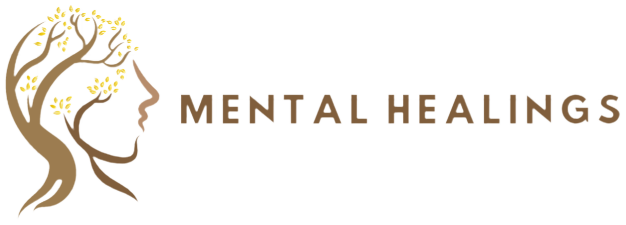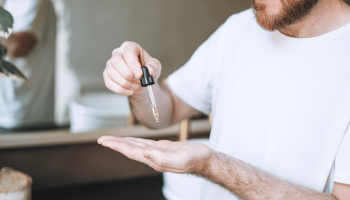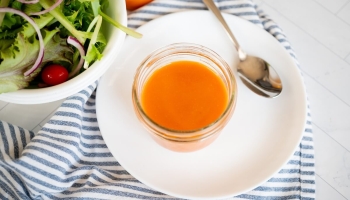
[ad_1]
A loving mother wants, above all else, good health for her child. Imagine, then, the emotional impact of discovering that your baby has eczema, of wishing more than anything to take away the itching and irritation. And imagine the worry when a woman with eczema becomes pregnant. The what-ifs are huge.
Fortunately, there is excellent information — and inspiration — to help a woman in either situation. Here, two moms reveal the great lengths they went to in their determination to give their children relief and good health.
Meghan Elliott, who lives in Kankakee, Illinois, is a busy mother of two: Nora, 4, and Charlie, 1. After the shock of finding that Charlie had eczema from birth, Elliott embarked on a quest to do everything she could to help him. She researched his needs, and then made sure the health system met them.
“Charlie had rough, scaly, bumpy skin,” says Elliott, an operations manager for the marketing company Mayhill Moon. At first, the inflammation was mostly on his cheeks and thighs, but it later began to develop on his elbows. “My son’s pediatrician officially diagnosed him with moderate to severe eczema and suggested we take him to a pediatric dermatologist.” Not a bad idea, but she and Charlie would have to spend months on a waiting list, which Elliott found “extremely frustrating.”
That’s when she set out to learn as much as possible about Charlie’s condition. One thing that struck her was that many children with eczema have moderate to severe food allergies. “Seeing how long it took to get referred to a pediatric dermatologist, I then took it upon myself to call a pediatric allergist. Thankfully, they got him in fairly quickly, and we found out that Charlie is severely allergic to all forms of eggs and also has a lactose intolerance.”
This was a watershed moment. “What we do now is lather his cheeks and chin with CeraVe Healing Ointment before and after he eats so as to not irritate his skin,” she says. “The ointment helps act like a barrier to any food that could cause a flare-up.”
Elliott carefully analyzed every aspect of Charlie’s routine to give him relief in a variety of ways. “One thing that has helped my son is giving him a bath every night,” she says. “I thought this would dry him out even more, but our dermatologist said a quick 5- to 10-minute lukewarm bath – after which we pat him dry and immediately lotion him up – will keep all the moisture in his skin. We use CeraVe lotion, shampoo, and body wash during his bath times. We also apply CeraVe healing ointment on his cheeks throughout the day to keep moisture locked in. Charlie was also prescribed two topical ointments to use as needed as well as an oral medication to help when he gets really itchy.”
To help him sleep, Elliott relies on the most gentle bedding. “We use bamboo crib sheets, and they are very breathable – when we use a flannel crib sheet, his cheeks are very irritated when he wakes up,” she says. “We also do a lot of bamboo clothing. He can wear cotton clothing, too, but we definitely stay away from any wool or polyester.” Charlie is now doing well. “We have a schedule of doctor follow-ups every 3 to 6 months, and he is doing so much better compared to where we were a year ago.”
The emotional toll of worry and constant care is considerable, however. “Parenting a child with eczema and food allergies is exhausting and frustrating,” she says. “Still, push for help in getting your child relief. My advice for other parents also going through this is to always be your child’s advocate. They can’t advocate for themselves, so it is our responsibility to do that for them.”
Karen Fischer is an award-winning nutritionist and author who lives and works on Australia’s Gold Coast. Dedicated to helping people with eczema through her online support network, she’s the owner of Skin Friend, a skin care company. Her own story – and that of her daughter Ayva, now 22 – is the reason she has made eczema relief her work and passion.
“I have lived the pain of head-to-toe eczema,” Fischer explains. “I have health practitioner qualifications, but I did not truly understand eczema until I lived it.”
Before becoming pregnant with Ayva, Fischer found herself dealing with the skin condition. “My eczema started off as a tiny patch,” she recalls. “After a bout of work stress, it suddenly spread to my entire body. Every time I ate, it would spread. Some nights the itch was so bad I could not sleep. I had to constantly wash my sheets, I could not eat out with friends, I was socially isolated. No one understood, and I spent a lot of time at home crying.”
Noticing the link between food and her flare-ups, Fischer took a close look at what she ate. “Your skin is literally made from the foods you eat, so it made sense to change my diet,” she says. “Genetics play a role, but I believe that eating healthy, low-chemical foods can compensate for these genetic defects.” Identifying which foods seemed to trigger her eczema – and eliminating them – helped Fischer get better.
Her pregnancy, fortunately, proved uneventful. “I had suffered from hand dermatitis before I became pregnant,” she says. “With healthy eating, it soon went away, so I had a rash-free pregnancy. However, Ayva developed eczema 2 weeks after she was born.” Fischer was devastated to see Ayva suffer, and the baby had difficulty sleeping, but it didn’t occur to the new mom right away that she could approach her daughter’s skin condition the same way she had managed her own. “I thought eczema was a genetic condition and there was nothing I could do, so I used topical steroids to unsuccessfully treat her eczema,” she recalls.
Then, a breakthrough: “A nurse caring for Ayva told me about food sensitivities, and she set me on the path that led to my daughter’s eczema clearing up. Nutritional biochemistry was my favorite subject at university, so I designed a diet specifically for Ayva based on the research I had read from various hospital allergy units. Ayva’s skin cleared up, and we gradually expanded her diet. The right foods can make your child’s body resilient.”
Today both mother and daughter are happy and healthy. “Eczema is a complicated skin disorder and everyone is quick to give you advice,” Fischer says – and then offers up some advice of her own. As she sees it, “Healthy eating is the long-term, permanent solution.”
[ad_2]
Source link






